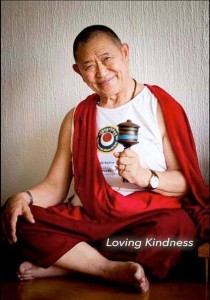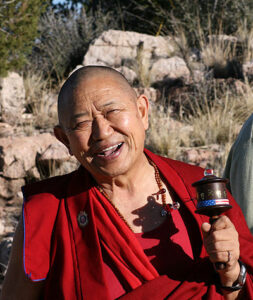The Subduer said that all the unbearable suffering of bad rebirths is the fruit of wrongdoing
 The Subduer said that all the unbearable suffering of bad rebirths is the fruit of wrongdoing
The Subduer said that all the unbearable suffering of bad rebirths is the fruit of wrongdoing
Therefore, even at the cost of your life, never do wrong
–This is the practice of Bodhisattvas
The eighth stanza concerns karma, one’s actions or deeds, and the result or consequence of them. In this life, all the suffering and miseries individuals experience are results of the ten non virtuous deeds. These non virtuous deeds are killing, stealing, and sexual misconduct which occur at the physical level; lying, slandering, using harsh words and talking nonsense which are the four negative actions that arise from speech; then, covetousness and the intention to harm others which are mental wrongdoing.
These negative deeds, actions and thoughts lead to our experience of suffering. In the Buddhist scriptures, it teaches that what we did in the past can be judged by the present condition of our life, and what we are going to experience in the future can be judged by what we are doing now.
For example, if one committed a lot of killing in past lifetimes, one will have a short human life. If in past lifetimes one was a miser and very tight or stingy when it came to generosity, one will take birth and live as a poor person. If in past lifetimes one indulged in deceitfulness, greed and jealously, then sickness and other consequences will arise as the karmic result.
As, for these reasons, it is obvious that our own afflicting emotions cause our own suffering, we should right away work with them and try to dispel them from the mind.
The Three Lower Realms (of Animals, Hungry Ghosts and Hell Inhabitants) undergo enormous suffering, and these lower realms reflect the three basic afflicting emotions: Anger, Attachment and Ignorance. If we wish to avoid taking birth in these states of existence, we have to dispel these three afflicting emotions from our mind.
The great yogi of Tibet, Jetsun Milarepa, stated that anger is the root and cause of the lower realms. Even at the cost of one’s life, one should not develop anger in the mind.
At this point, of course, many questions arise from practitioners, such as what happens then if someone tries to kill me. Should I protect myself or just sit, letting someone murder me?
The fact is that, if one has the karma to be killed, no matter how much anger one expresses or develops, no matter how much one’s charges at one’s enemy, no matter how mentally anguished one becomes, one is going to die. And, if one does not have the karma to die, then one will not be killed.
So, there is no real or practical point with developing anger. When arises in the mind, it destroys all the merits and good seeds we have accumulated over many lifetimes as good practitioners; anger destroys bodhicitta. Bodhicitta is the string by which we hold onto until enlightenment is reached. But, anger cuts that thread and we fall down then. The moment anger arises, it disconnects all our spiritual practice.For this reason, anger should never be allowed to arise in the mind. If one recognizes anger as poisonous, let it subside. This stanza of Thogme’s work is very meaningful; special reflection and emphasis should be placed on it. Anger destroys the root of virtue.
What is the root of virtue? It is love, compassion and bodhicitta.
In our life, we live with parents, friends and children, and grow to have love for the family. But once anger arises in one of us, that love is destroyed in the family. This is how anger ruins the root of virtue and merit. The most supreme type of merit and virtue is developing the relative and ultimate forms of bodhicitta. Only through training oneself in the relative bodhicitta which is love and compassion, can one realize the ultimate bodhicitta which the enlightened ones have attained.
The ego, our constant reaffirmation of the existence of a permanent self which must be satisfied, is the total opposite of love and compassion; it is the opposite of the Mahayana path. As long as one’s mind is occupied by the ego’s games, love and compassion will not fully arise in the mind.
This can be understood with a simple example. If a mirror is dusty and full of dirt, no reflection can be seen in it. So, if one wipes off all the dust and dirt from this mirror, it has now been made clean. Everything can now be reflected in this mirror.Similarly, if one fails to diligently cultivate love and compassion for all sentient beings, the ultimate form of bodhicitta cannot be realized by a practitioner. One is like a dead person, spiritually for sure, if there is a complete lack of love, compassion and bodhicitta.
One’s body is literally useless, even if it has all the limbs and sense organs, when it is just a dead corpse. Likewise, one’s spiritual practice and accomplishment is meaningless, there will be no realization, without bodhicitta.
This ego, which contaminates the mind, can only be wiped out by the love and compassion which aims at benefiting others. For many of us, ordinarily, anger and attachment arise in the mind often. But, if the practitioner is able to recognize and notice it immediately, and at the moment you see it as something negative, it then is no longer a “big deal.” That anger and attachment will die and simmer down once one begins to understand they are the roots of unhappiness. This is the beginning of the supreme qualities of bodhicitta. Even if anger arises, love and compassion can recognize it and continue to be active.



